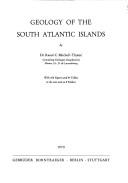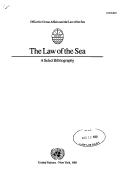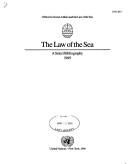| Listing 1 - 10 of 82 | << page >> |
Sort by
|

ISBN: 344311010X Year: 1970 Volume: Bd. 10 Publisher: Berlin ; Stuttgart : Borntraeger,
Abstract | Keywords | Export | Availability | Bookmark
 Loading...
Loading...Choose an application
- Reference Manager
- EndNote
- RefWorks (Direct export to RefWorks)
Book
ISBN: 9232013568 9789232013569 Year: 1979 Publisher: Paris: UNESCO,
Abstract | Keywords | Export | Availability | Bookmark
 Loading...
Loading...Choose an application
- Reference Manager
- EndNote
- RefWorks (Direct export to RefWorks)
Marine pollution. --- Oceanographie --- Mers et oceans --- Pollution
Book
ISBN: 9791021319769 Year: 2012 Publisher: [Paris?] : Editions la Bibliothèque Digitale,
Abstract | Keywords | Export | Availability | Bookmark
 Loading...
Loading...Choose an application
- Reference Manager
- EndNote
- RefWorks (Direct export to RefWorks)
Ocean. --- Oceans --- Sea, The --- Bodies of water

Abstract | Keywords | Export | Availability | Bookmark
 Loading...
Loading...Choose an application
- Reference Manager
- EndNote
- RefWorks (Direct export to RefWorks)
Maritime law --- Droit maritime --- Bibliography --- Bibliographie --- Mers et oceans --- Droit

Abstract | Keywords | Export | Availability | Bookmark
 Loading...
Loading...Choose an application
- Reference Manager
- EndNote
- RefWorks (Direct export to RefWorks)
Maritime law --- Droit maritime --- Bibliography --- Bibliographie --- Mers et oceans --- Droit
Book
Abstract | Keywords | Export | Availability | Bookmark
 Loading...
Loading...Choose an application
- Reference Manager
- EndNote
- RefWorks (Direct export to RefWorks)
The ocean plays a central role in the life and development of human kind. Besides space for navigation and trade (roughly 10 billion tons of commodities are transported across the oceans each year), the provision of biological and non-living resources is the most important service of the marine ecosystems. Yet, these ecosystems are increasingly impeded by human activities and interventions. Human and naturally induced changes in climate are buffered by the ocean, but its capacity to compensate the increase of CO2 in the atmosphere is at its limit. The increase of global temperatures and the decrease of oxygen concentration and pH are severe stressors for aquatic species and thus for the whole ecosystem. Urbanisation and population growth at the coast, along with severe levels of pollution, are stressing coastal environments and hampering or interrupting life cycles of species as well as the well established and naturally balanced internal interconnections within and between ecosystems. Mining for oil and gas is interfering with fisheries, competing for space with other sectors and increasing the risks for large scale pollution. The result is a decline in ecosystem services and a negative feedback into the socio-economic systems. The recent reports by IPBES and IPCC underline the degrading conditions in which the ecosystems are situated today. The IPBES report evaluates a number of direct and indirect drivers. Population increase, technical development, malfunctioning of governance and spreading of conflicts affect direct drivers such as sea use change, direct exploitation, climate change, pollution, invasive species and others. read less Following a series of summits and conventions that prompted the United Nations in recent decades, Rio de Janeiro in 1992, Johannesburg in 2002 and Rio+20 in 2012, all of which were rather land-based, the Sustainable Development Goals 2015 set a new landmark in which the ocean, too, was finally acknowledged as significant to global development. The Ocean Conference in New York in June 2017 led the international community to formulate clear goals for the development of the ocean. The volume Transitioning to Sustainable Life below Water will address critical issues in ocean use and reflect against goals and targets of SDG 14 and other relevant SDGs. Transitioning to Sustainable Life below Water is part of MDPI's new Open Access book series Transitioning to Sustainability. With this series, MDPI pursues environmentally and socially relevant research which contributes to efforts toward a sustainable world. Transitioning to Sustainability aims to add to the conversation about regional and global sustainable development according to the 17 SDGs. Set to be published in 2020/2021, the book series is intended to reach beyond disciplinary, even academic boundaries.
Life sciences: general issues --- biodiversity --- oceans --- sustainability --- life below water
Periodical
ISSN: 26621746 20966490 Year: 2019 Publisher: Singapore : Springer Singapore,
Abstract | Keywords | Export | Availability | Bookmark
 Loading...
Loading...Choose an application
- Reference Manager
- EndNote
- RefWorks (Direct export to RefWorks)
Marine Biology --- Oceans and Seas --- Aquatic Organisms --- Aquatic Organisms. --- Oceans and Seas. --- Marine Biology. --- Seas. --- Marine biology. --- Mers. --- Biologie marine. --- seas. --- marine biology.
Book
ISBN: 9780692622018 Year: 2016 Publisher: Punctum Books
Abstract | Keywords | Export | Availability | Bookmark
 Loading...
Loading...Choose an application
- Reference Manager
- EndNote
- RefWorks (Direct export to RefWorks)
More&More is an art and research project that explores the language and mechanics of global trade, container shipping, and the exchange of goods. It questions a mercantile structure that by necessity disallows the presence of ocean as a real space in order to flatten the world into a Pangaea of capital. The project is presented in two volumes, released in conjunction with an exhibition of Marina Zurkow’s work (with collaborators Sarah Rothberg, Surya Mattu, and others) at bitforms gallery in New York City in February 2016. This book, More&More (A Guide to the Harmonized System), is an experimental “brick” of a book that intervenes in the Harmonized Commodity Description and Coding System (also known as the HS Code). The HS Code is the internationally accepted standard of product classification, which codifies the way nations conduct import/export. All legal trade products (and illegal ones that find loopholes) are shipped using this system. More&More (A Guide to the Harmonized System) lists the astonishing variety of items that are shipped around the world, and includes instructions for using the code to ship items (both legally and illegally). It also includes poetic, personal, and scholarly annotations by Stacy Alaimo, Heather Davis, Kathleen Forde, Dylan Gauthier, Elena Glasberg, Calliope Mathios, Steve Mentz, Astrida Neimanis, Chris Piuma, Elspeth Probyn, Sarah Rothberg, Phil Steinberg, Rita Wong, and Marina Zurkow. Its companion book, More&More (The Invisible Oceans), is a catalog of the exhibition, featuring many full-color images of the art on display (including video stills, bespoke bathing suits, and fungal sculptures), as well as an introduction by Marina Zurkow and a conversation between Zurkow and international curator Kathleen Forde.
Individual artists, art monographs --- Ocean --- Environmental aspects. --- Oceans --- Sea, The --- Bodies of water --- Oceanography --- exhibition catalog
Book
Year: 2020 Publisher: Frontiers Media SA
Abstract | Keywords | Export | Availability | Bookmark
 Loading...
Loading...Choose an application
- Reference Manager
- EndNote
- RefWorks (Direct export to RefWorks)
While there is growing evidence of the importance of marine ecosystems for our societies, evidence shows also that pressures from human activities on these ecosystems are increasing, putting the health of marine ecosystems at stake worldwide. Hence, Blue Economy is becoming an important component of future socio-economic development strategies (e.g. this is called Blue Growth in Europe), that eventually can result in increasing pressures at sea, and despite the current regulatory framework (in particular with the Oceans Act, in USA or Canada, and the Marine Strategy Framework Directive, in Europe), it is likely that this situation will continue in the future. Ensuring all those connected to the sea, directly or indirectly, gain a better understanding of the importance of the seas, the human-sea interactions and opportunities to act better and reduce impacts from human pressures, is central to Ocean Literacy (OL). Receiving increasing attention in Europe and USA, OL is a challenge for all parts of society: educators & trainers, children and professionals, civil society and scientists, consumers and policy/decision makers. It is seen as part of the package of solutions that will lead to a change in behavior and practice, thus reducing impacts and resulting in healthier marine ecosystems, whilst allowing development opportunities offered by seas are seized in a sustainable manner. This Research Topic focuses on the issues and options for effective OL worldwide. It discusses: (1) existing experiences in OL (formal and informal education for children, training for professionals, tools for raising awareness of consumers – and of investors in the marine sectors…) and their effectiveness (from understanding better to acting differently); (2) the role OL could play (in interaction with innovation, regulation, economic incentive, social norms…) to support human capital development as key component of sustainable growth; and (3) pre-conditions for effective OL for different sectors and target groups. Questions relevant to OL include: Which knowledge – produced by whom – to share and how? Who to target – and how to effectively reach those targeted? How to design OL initiatives – including by mobilizing those targeted (via living lab approaches e.g.) – to ensure effective OL and pave the way for behavior change? What are the knowledge gaps that limit our capacity to design effective OL? As scientists, it is likely you have many more questions to offer and discuss.
Science: general issues --- Oceanography (seas) --- ocean literacy --- ResponSEAble --- behavior change --- attitude toward oceans --- human pressures
Book

Year: 2019 Publisher: Frontiers Media SA
Abstract | Keywords | Export | Availability | Bookmark
 Loading...
Loading...Choose an application
- Reference Manager
- EndNote
- RefWorks (Direct export to RefWorks)
This eBook is a collection of articles from a Frontiers Research Topic. Frontiers Research Topics are very popular trademarks of the Frontiers Journals Series: they are collections of at least ten articles, all centered on a particular subject. With their unique mix of varied contributions from Original Research to Review Articles, Frontiers Research Topics unify the most influential researchers, the latest key findings and historical advances in a hot research area! Find out more on how to host your own Frontiers Research Topic or contribute to one as an author by contacting the Frontiers Editorial Office: frontiersin.org/about/contact
Science: general issues --- Oceanography (seas) --- Phosphorus --- biogeochemistry --- Monitoring --- Eutrophication --- Estuaries --- Soil --- Rivers --- Lakes --- Oceans
| Listing 1 - 10 of 82 | << page >> |
Sort by
|

 Search
Search Feedback
Feedback About UniCat
About UniCat  Help
Help News
News